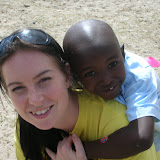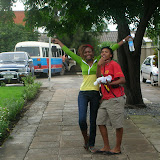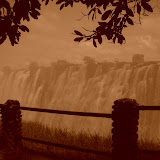
Beautiful isn't it?
This was taken from a township called Khayelitsha, about 30 mins from Cape Town.I suppose I really should explain what the townships are like. In other countries, like Zambia, they are sometimes called "compounds". They look like areas you see on TV when some B List celebrity shuffles through a community speaking about the Foster Parents Plan. In South Africa, historically they are the areas where either the 'blacks' or the 'coloureds'* were relegated to in the days of Apartheid (the '60's and '70's up until a mere 15 years ago). Khayelitsha is one of the more dangerous places in South Africa. Don't quite get that feeling from the picture though huh?
*(the term “coloured” is not offensive in SA and it refers to either a lighter-skinned black person or a person of other ethnicity such as Malaysian)
A book was recently published (by Penguin) called Khayelitsha - told by a white man who either lived there or spent a lot of time there. It would definitely be an interesting read for anyone wanting to know a real experience.
This is a good time to checkout my other blog at www.grassrootsoccer.org (see link in top right hand side of this page. I’ve just put in an entry with some good pictures and a pretty thorough explanation of what’s going on at this site.
Basically (as that blog says), things started off slow here with work. I did as much as I could, tried to think of jobs that would take us further, but with a lack of infrastructure, I kept hitting walls.
Saved
Thankfully though, and somewhat miraculously, Dr. Paul Roux found me and asked if I would be interested in working with him at the paediatric ward of the Groote Schuur public hospital in the city. Well, he ‘found me’ in his own house – I am staying with him and his family.
But the amazing thing is I was not meant to be living here in the first place. A series of fortunate events brought me here through other connections. It all worked out very well! I hadn’t even met him in my first weeks of staying here; he was away at a conference. On his first night back we spoke about our backgrounds and within minutes it was established that I would be perfect to help out at the hospital with a few projects.
My other job
Basically I go in with him a few days a week and work with either Ludwig – a German med student in his residency who is doing a retrospective study on HIV and tuberculosis or Kate, a former Math Professor at UCT who retired early to dedicate her life to public health. She runs a beadwork project called BeadsPositive which provides about 150 HIV+ mothers, who otherwise have no source of income, a chance to make enough to feed their children and pay for their medication.
Paul (Dr. Roux) is the co-founder of an amazing non-profit called KidzPositive which provides care for HIV Positive children and their families. He is also the co-founder of PATA – Paediatric AIDS Treatment for
Journalist extraordinaire
I have been invited to PATA's annual conference in
I still am heavily involved with GRS Cape Town (which is why you must read my other blog…!). Hopefully this gives you a better idea of how my life changes every day and why I can never seem to easily sum it up!
















